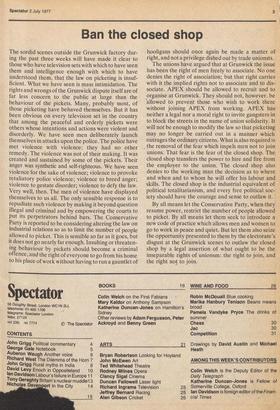Ban the closed shop
The sordid scenes outside the Grunwick factory dur- ing the past three weeks will have made it clear to those who have television sets with which to have seen them and intelligence enough with which to have understood them, that the law on picketing is insuf- ficient. What we have seen is mass intimidation. The rights and wrongs of the Grunwick dispute itself are of far less concern to the public at large than the behaviour of the pickets. Many, probably most, of those picketing have behaved themselves. But it has been obvious on every television set in the country that among the peaceful and orderly pickets were others whose intentions and actions were violent and disorderly. We have seen men deliberately launch themselves in attacks upon the police. The police have met violence with violence: they had no other remedy. The violence was not of their making. It was created and sustained by some of the pickets. Their anger was synthetic and self-righteous. We have seen violence for the sake of violence; violence to provoke retaliatory police violence; violence to breed anger; violence to gestate disorder; violence to defy the law. Very well, then. The men of violence have displayed themselves to us all. The only sensible response is to repudiate such violence by making it beyond question illegal and criminal and by empowering the courts to put its perpetrators behind bars. The Conservative Party is reported to be considering altering the law on industrial relations so as to limit the number of people allowed to picket. This is sensible so far as it goes, but it does not go nearly far enough. Insulting or threaten- ing behaviour by pickets should become a criminal offence, and the right of everyone to go from his home to his place of work without having to run a gauntlet of hooligans should once again be made a matter of right, and not a privilege dished out by trade unionsts.
The unions have argued that at Grunwick the issue has been the right of men freely to associate. No one denies the right of association; but that right carries with it the implied rights not to associate and to dis- sociate. APEX should be allowed to recruit and to organise at Grunwick. They should not, however. be allowed to prevent those who wish to work there without joining APEX from working. APEX has neither a legal nor a moral right to invite gangsters in to block the streets in the name of union solidarity. It will not be enough to modify the law so that picketing may no longer be carried out in a manner which outrages the ordinary citizens. What is also required is the removal of the fear which impels men not to join unions. That fear is the fear of the closed shop. The closed shop transfers the power to hire and fire from the employer to the union. The closed shop also denies to the working man the decision as to where and when and to whom he will offer his labour and skills. The closed shop is the industrial equivalent of political totalitarianism, and every free political soc- iety should have the courage and sense to outlaw it.
By all means let the Conservative Party, when they resume power, restrict the number of people allowed to picket. By all means let them seek to introduce a new code of practice which allows men and women to go to work in peace and quiet. But let them also seize the opportunity presented to them by the electorate's disgust at the Grunwick scenes to outlaw the closed shop by a legal assertion of what ought to be the inseparable rights of unionsm: the right to join, and the right not to join.


































 Previous page
Previous page